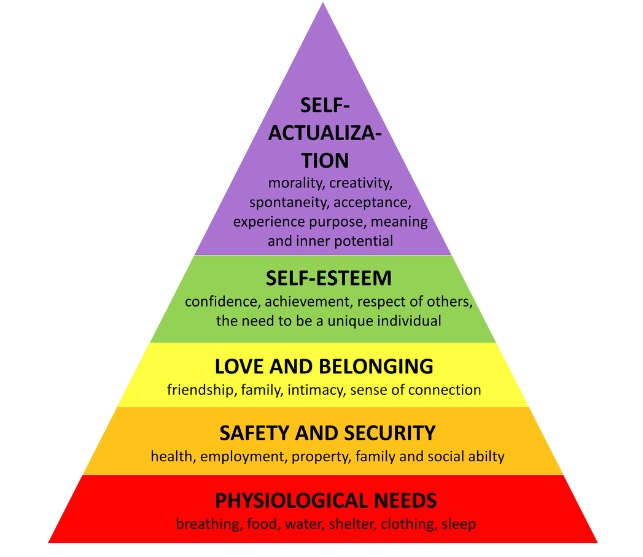Gaurav Jain is a Principal at Founder Collective, an early stage VC firm based in Cambridge and NYC that has made investments in 150 companies including Uber, Buzzfeed, and Makerbot. He cofounded Polar and was an early Product Manager for Android. Follow him @gjain.
When you look at Maslow’s Hierarchy of Needs (above) from a business perspective, it almost looks like a consulting business: A founder starts generating revenue by taking on client work to meet their physiological need to pay rent and purchase food. Building up financial reserves meets the need for safety. With enough success, the entrepreneur can hire a team to create a sense of belonging. Awards or recognition confer esteem, and the pinnacle of self-actualization comes from choosing which projects to work on.
Innovation-driven startups tend to flip the model. Think Mark Zuckerberg and Facebook.
A lone founder, or small team, has an idea and just builds it, just for the sake of doing so, or self-actualization. They share it on Product Hunt, Hacker News, or VentureBeat to build a little esteem. Users pick up on the product, giving the creators a sense of belonging. VCs swoop in and give the company a sense of safety in the form of a round of funding. At some point, the company generates company-sustaining revenue to meet the physiological needs of its employees, or dies.
World Changing Startups Start with Self-Actualization
The first kind of company is great. There are tens, maybe hundreds of thousands of businesses that fit this mold. They provide valuable services to their communities and can provide a nice living for their founders and employees. But they’re unlikely to be written up in tech magazines or textbooks. Recruiting will largely come down to location, compensation, and culture. Eye-popping valuations are vanishingly rare.
The second kind of company reshapes the landscape. Uber, one of our investments, is transforming the way people navigate the world’s greatest cities. As Basecamp founder Jason Fried notes in this article for Inc Magazine, the impetus for Uber wasn’t a deep-seated passion for logistics but rather a frustration with the status quo. Most people would channel that frustration through an artfully crafted tweet; Travis Kalanick started a company that transformed the way we traverse cities. Creating world-changing projects, be it the Pharaoh’s pyramids or Facebook, requires a healthy ego.
Know Thyself
It’s easy to see how consumer-facing startups can start with actualization. It’s harder to imagine self-actualization coming from Ad-Tech, but for many of our companies, it does. B2B businesses are typically less sexy than consumer facing offerings, but for many founders the self-actualization comes in a different form.
Some are motivated by the promise of huge paydays. Others, the autonomy of running their own business. Many are genuinely passionate about the business of business and are happy to exploit an opportunity, irrespective of the field. A rare few actually geek out on things like DNS.
As a founder it’s important to know what your motivations are. Are you passionate about a technology? A market sector? A trend? A way of working?
Social networks require a sort of missionary zeal around a new product concept, combined with a bit of luck. B2B companies need a founder with the ferocity to out compete Larry Ellison.
Startups that start with a foundation of self-actualization aren’t as stable, and many will fail. Those that survive and progress through to the bottom of the pyramid will be rewarded with insane growth and a chance to build a business for the ages.
[Explore more VentureBeat opeds here.]
Gaurav Jain is a Principal at Founder Collective, an early stage VC firm based in Cambridge and NYC that has made investments in 150 companies including Uber, Buzzfeed, and Makerbot. He cofounded Polar and was an early Product Manager for Android. Follow him @gjain.
VentureBeat's mission is to be a digital town square for technical decision-makers to gain knowledge about transformative enterprise technology and transact. Learn More

